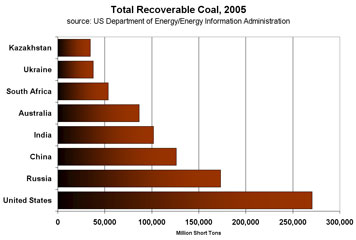US has low-cost alternatives to oil; peak oil frenzy and human-induced climate change avoidable says Columbia University report
US has low-cost alternatives to oil; peak oil frenzy and human-induced climate change avoidable says Columbia University report
mongabay.com
May 14, 2006
Surging oil prices have fueled calls for the United States to develop new sources of affordable and secure domestic energy. While renewable energy — especially biofuels, wind power, and solar technologies — is an area of particular interest, researchers from the Earth Institute at Columbia University say that the U.S. already has relatively low-cost alternatives to imported oil, including coal, tar sands, and oil shale. These resources can be extracted and used at a lower cost to the environment than some might expect.
In a report published in the most recent issue of Brookings Papers on Economic Activity, Klaus S. Lackner and Jeffrey D. Sachs argue that “coal alone could satisfy the country’s energy needs of the twenty-first century.” They say that “coal liquefaction, or the process of deriving liquid fuels from coal, is already being used in places and with expanded infrastructure could provide gasoline, diesel fuel and jet fuel at levels well below current prices.” Further, Sachs and Lackner suggest that “environmental constraints such as increased carbon dioxide emissions arising from greater use of coal and other fossil fuels could be avoided for less than 1 percent of gross world product by 2050,” a sum far less than others have estimated.
“[With widespread use of coal liquefaction] the long-term price of liquid hydrocarbon fuels may be lower than it is today, even allowing for pessimistic forecasts for oil and gas reserves,” Sachs and Lackner write. “Even with the most conservative assumptions about learning curves, it appears quite safe to predict that the cost of synthetic oil from coal or other processes, after some transitional pains, will be below $30 per barrel.”
Sachs and Lackner make a case that because the U.S. has large coal deposits — the most extensive in the world — it would be less vulnerable to political uncertainties in other parts of the world.
They say another promising alternative to imported oil are tar sands and oil shale, both of which are found in abundance on the North American continent. Scientists estimate the energy content of Canadian tar sand deposits is comparable to that of the oil fields in Saudi Arabia.
 High oil prices fuel bioenergy push High oil prices and growing concerns over climate change are driving investment and innovation in the biofuels sector as countries and industry increasingly look towards renewable bioenergy to replace fossil fuels. Bill Gates, the world’s richest man, has recently invested $84 million in an American ethanol company, while global energy gluttons ranging from the United States to China are setting long-term targets for the switch to such fuels potentially offering a secure domestic source of renewable energy and fewer environmental headaches. |
|
“There are no serious long-term (century-scale) shortages of fossil fuel supply once the interconvertibility of oil and other fossil fuels is taken into account,” write the authors. “Even the arrival of ‘peak oil’–the point at which oil production reaches a maximum–would not mean a global energy shortage at today’s prices. However, the transition from oil to other sources of liquid fuel will require a significant lead time, and engineering that transition should be part of public policy.”
Given the abundant supply of alternative energy sources, the authors argue that over the long-term, the limiting factor presented in increased use of fossil fuels “is environmental rather than one of availability.” Rising atmospheric concentrations of greenhouse gases — especially carbon dioxide — are of the greatest concern.
“Carbon emissions will have to be mitigated, because the business-as-usual course is fraught with grave global risks,” note the authors. “The limits on the global oil supply will not reduce the risks from CO2, since coal and other low-cost fossil fuels will in any event substitute for declining supplies of petroleum and natural gas, and their CO2 emissions will be larger, not smaller.”
Sachs and Lackner believe that new technologies that capture and sequester carbon dioxide below ground could help prevent
human-induced climate change at a cost of less than one percent of gross world product by 2050. Cleaner, more efficient use of coal and other resources could also play a key role in addressing climate change.
 Current coal reserves. Source: US Department of Energy/Energy Information Administration Cleaner, more efficient use of coal could play a key role in addressing climate change, especially with the growing importance of coal as an energy source as world crude oil supplies are diminished in the future. Coal presently supplies about two-thirds of China’s energy and one-third of the energy demand in the United States but, due to its abundance, is forecast to become an increasingly important relative to petroleum around mid-century. |
|
The authors propose that, depending on the political climate, these efforts may be funded through a global tax on carbon emissions, a global tradable permits system, or through regulatory measures.
“Economic logic suggests that these goals could best be accomplished through a uniform tax on carbon emissions imposed on all fossil-fuel users in all regions, or by a global tradable permits system. But both approaches might prove to be administratively or politically impossible to implement,” Sachs and Lackner write. “It might be easier in the end to focus on the much smaller number of decision makers involved in licensing new power plants and setting future automotive efficiency standards.”
“Whatever we do, we know we are going to have to approach this complex problem in a multi-faceted way and from a global perspective,” said Sachs, director of The Earth Institute, in a news release. “The key is we have to start now and we have to commit ourselves to making a change before change is forced on us. Fortunately, there are promising technologies that may well offer us solutions at large scale and reasonably low cost.”
Related articles
U.S. can cut oil imports to zero by 2040, oil use to zero by 2050 March 29, 2007
The United States could dramatically cut oil usage over the next 20-30 years at low to no net cost, said Amory B. Lovins, cofounder and CEO of the Colorado-based Rocky Mountain Institute, speaking at Stanford University Wednesday night for a week-long evening series of lectures sponsored by Mineral Acquisition Partners, Inc.
Nobel prize winner debates future of nuclear power June 7, 2007
Two renowned energy experts sparred in a debate over nuclear energy Wednesday afternoon at Stanford University. Amory Lovins, Chairman and Chief Scientist of the Rocky Mountain Institute, an energy think tank, argued that energy efficiency and alternative energy sources will send nuclear power the way of the dinosaurs in the near future. Dr. Burton Richter, winner of the 1976 Nobel Prize in physics, said that nuclear would play an important part of the future energy portfolio needed to cut carbon emissions to fight global warming.
This article is based on a news release from the Earth Institute at Columbia University and “A Robust Strategy for Sustainable Energy” published in the most recent issue of Brookings Papers on Economic Activity.